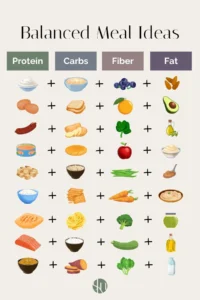The Importance of Balanced Nutrition Across Life Stages
As we celebrate National Nutrition Week 2024, the significance of a balanced diet and proper nutrition has never been more relevant. The food we eat plays a critical role in shaping our health, energy levels, and overall well-being at every stage of life. From infants to adults in their golden years, nutritional needs change, requiring different dietary considerations. But achieving a balanced diet isn’t as simple as sticking to one formula — it’s a journey that evolves as we do. So, how can we ensure that people of all ages meet their nutritional needs?
This guide delves into how to nourish your body, providing practical, age-specific tips that can help you live a healthier, more vibrant life. Whether you’re a parent feeding a toddler or an adult over 50 looking to stay healthy, there are essential tips for everyone.
Infants and Toddlers: Building a Strong Nutritional Foundation

The early years of life are a time of rapid growth and development, making proper nutrition crucial. Babies and toddlers require a diet rich in essential nutrients to support their physical and cognitive development. The key during these years is to focus on whole, nutrient-dense foods that provide the building blocks for lifelong health.
Exclusive Breastfeeding: The Ideal Start
For the first six months of life, exclusive breastfeeding is recommended as it offers all the nutrients an infant needs. Breast milk contains antibodies that help build immunity, as well as fats, proteins, and carbohydrates necessary for healthy growth. Mothers are encouraged to breastfeed as much as possible since it sets the stage for a healthy future.
Introduction of Solid Foods: Timing is Key
Around six months of age, infants are ready for solid foods. Introducing nutrient-rich options like pureed meats, iron-fortified cereals, and mashed vegetables ensures they get essential minerals like iron, calcium, and vitamins. Iron is especially important during this phase as it supports brain development and oxygen transportation in the body.
Nutritious Snacks: Fostering Healthy Eating Habits Early On

Toddlers can be picky eaters, but introducing a variety of fruits, vegetables, and whole grains from the beginning helps set a positive foundation. Opt for natural snacks like mashed fruits, soft-cooked vegetables, and yogurt rather than sugary processed foods. Establishing healthy eating habits during this phase will make a big difference as they grow.
Children (4-12 years): Fueling Active Bodies and Growing Minds
As children grow older and become more active, their nutritional needs change. This period is marked by rapid physical and cognitive growth, requiring a variety of nutrients to fuel their energy levels and brain development. Encouraging children to eat balanced meals, coupled with physical activity, sets the stage for lifelong healthy habits.
Balanced Meals: A Rainbow on Their Plate

Children in this age group need a colorful and varied diet that includes fruits, vegetables, lean proteins, whole grains, and dairy. A visually appealing, colorful plate often signifies a balanced range of nutrients. It’s essential to teach children about the importance of different food groups and the role they play in their development.
Portion Control and Regular Meals
Establishing good portion control habits at this stage can prevent overeating and obesity later in life. Offer three balanced meals a day, accompanied by healthy snacks. Avoid processed foods high in sugar, fat, and salt, which can contribute to energy crashes and poor concentration.
Physical Activity: Fueling Growth with Movement

A healthy diet is just one part of the equation for growing children. Physical activity is equally important, promoting not only physical health but also improved focus, sleep, and emotional well-being. Encourage at least an hour of physical activity each day to complement a balanced diet.
Teenagers (13-19 years): Navigating the Nutritional Challenges of Adolescence
Teenage years bring with them growth spurts, hormonal changes, and increased academic and social demands. These years can be tricky for nutrition as teenagers often have irregular eating habits and a propensity for fast food. But it’s more important than ever for them to prioritize nutrition as their bodies and brains are undergoing rapid changes.
Nutrient-Dense Choices: The Key to Sustained Growth

Teens need more energy than any other age group, and that energy should come from nutrient-dense foods. Proteins, healthy fats, and whole grains are critical, but so is ensuring adequate intake of calcium and vitamin D to support growing bones. This is especially important for teenage girls, who are at higher risk of developing bone health issues later in life.
Mindful Eating and Body Image
Teenagers are particularly susceptible to developing unhealthy relationships with food, whether that’s through overeating or restrictive diets. Educating them on mindful eating — recognizing hunger cues and eating to nourish the body rather than for emotional reasons — can help them develop a healthy attitude toward food.
Hydration and Healthy Snacks
Teenagers often reach for sugary beverages and snacks, but water and nutrient-rich snacks should be their go-to choices. Encourage drinking plenty of water throughout the day and snacking on nuts, fruits, or whole grains instead of processed foods.
Adults (20-50 years): Maintaining Health and Energy in Adulthood
Adulthood is a time of balancing work, family, and personal goals, often leaving little time to focus on nutrition. However, maintaining a balanced diet during these years is essential for long-term health. Adults must focus on maintaining energy, preventing disease, and managing weight through proper nutrition.
Also Read: https://newsreporto.com/is-india-on-the-brink-of-a-monkeypox-outbreak/
Balanced Diet: A Foundation for Longevity

A balanced adult diet should consist of lean proteins, healthy fats, whole grains, and a generous portion of fruits and vegetables. This age group should pay special attention to portion control to prevent weight gain, especially as metabolism begins to slow in the later part of this stage. Cutting down on processed foods and added sugars is critical.
Heart-Healthy Choices: Promoting Cardiovascular Health
Heart disease remains a leading cause of death in adults, making it important to consume heart-healthy foods. Fatty fish, olive oil, nuts, and seeds should be staples in a heart-friendly diet, while red meat should be limited. Plant-based proteins, such as legumes, are also excellent substitutes that reduce the risk of heart disease.
Staying Active: Physical Activity as a Companion to Nutrition
A healthy diet alone won’t suffice — regular physical activity is crucial for maintaining a healthy weight, boosting mood, and preventing chronic illnesses. Aim for 30 minutes of exercise on most days, whether it’s walking, jogging, swimming, or strength training.
Older Adults (50+ years): Nutritional Needs in the Golden Years
Yet again as we age, our nutritional needs change. Older adults often need fewer calories but require more vitamins, minerals, and fiber to maintain health. These years are marked by a greater focus on preventing disease and managing conditions like osteoporosis, heart disease, and digestive issues.
Calcium and Vitamin D: Supporting Bone Health
With bone density naturally declining in older age, it’s essential to consume adequate calcium and vitamin D to prevent fractures and osteoporosis. Dairy products, leafy greens, and fortified foods are excellent sources, and regular exposure to sunlight can help maintain vitamin D levels.
Fiber-Rich Foods: Supporting Digestive Health
As the digestive system slows down with age, fiber becomes more important. Whole grains, fruits, vegetables, and legumes help to support digestive health and prevent constipation. Older adults should also drink plenty of fluids to stay hydrated and aid digestion.
Smaller, Frequent Meals for Steady Nutrient Intake
For many older adults, eating smaller, more frequent meals can aid digestion and prevent malnutrition. These meals should still be balanced, providing a variety of nutrients that the body needs to function optimally.
Nourish Your Body at Every Stage of Life
No matter what stage of life you’re in, balanced nutrition is the foundation for good health. From toddlers to seniors, following these age-specific tips can help you meet your body’s changing nutritional needs. National Nutrition Week 2024 serves as a timely reminder that it’s never too late — or too early — to start making healthier food choices.

